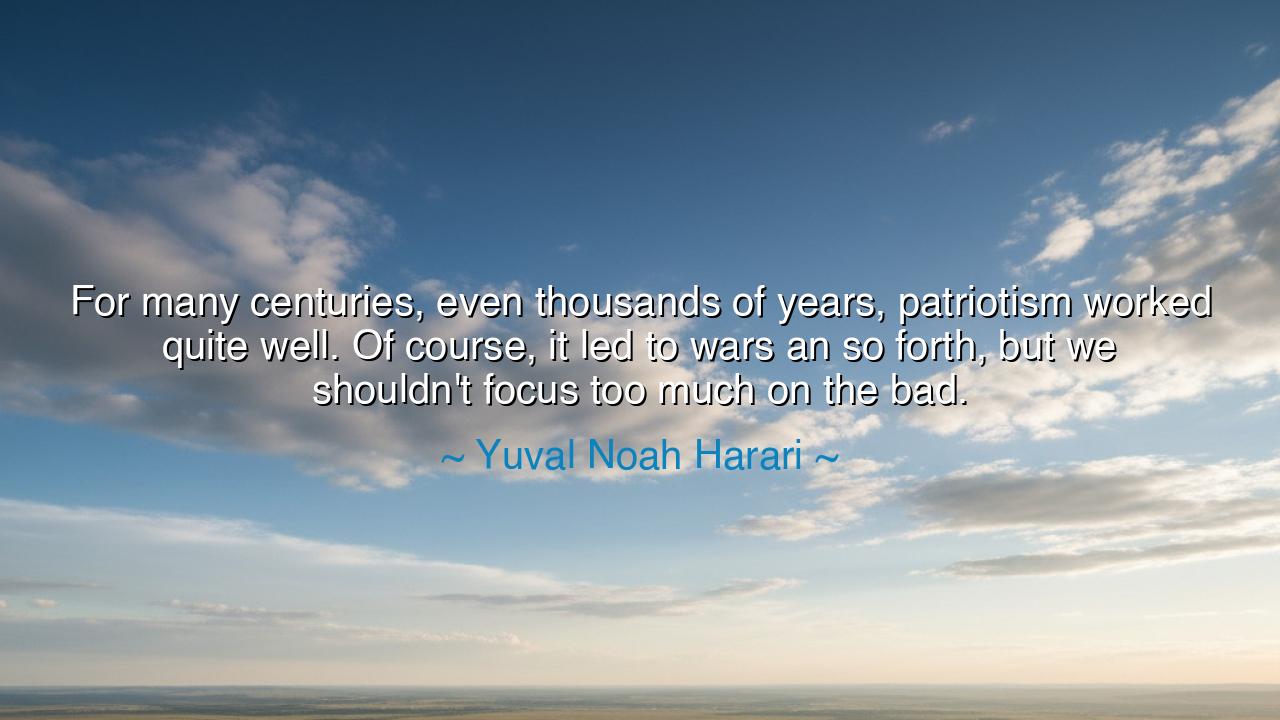
For many centuries, even thousands of years, patriotism worked
For many centuries, even thousands of years, patriotism worked quite well. Of course, it led to wars an so forth, but we shouldn't focus too much on the bad.






“For many centuries, even thousands of years, patriotism worked quite well. Of course, it led to wars and so forth, but we shouldn’t focus too much on the bad.” Thus speaks Yuval Noah Harari, the historian who gazes across the vast arc of human existence and discerns patterns hidden from the eyes of ordinary men. In this declaration, he lifts the veil on patriotism, that powerful force which has bound peoples together, forged nations, and propelled humanity to unity in purpose. He does not deny its darker fruits—conflict, conquest, blood—but he calls us to see also the order, the loyalty, and the shared identity that patriotism has provided through the long centuries.
The origin of this reflection lies in Harari’s study of civilization itself. From the earliest tribes who painted their bodies in common colors, to the city-states of Greece, to the empires of Rome and China, men have always found strength in devotion to the group. This devotion—this early patriotism—was not abstract but deeply practical. It inspired warriors to defend walls, farmers to surrender grain for armies, and citizens to sacrifice for the common good. Without such binding force, human societies might have splintered into fragments too weak to withstand famine, invasion, or the chaos of disunity.
Consider the tale of Rome. For centuries, its citizens bore not only swords but a fierce loyalty to the Republic and later the Empire. This patriotism, though it often drove them into wars of conquest, also created roads, aqueducts, law, and order across a vast territory. Rome’s unity endured far longer than the lifespan of any single generation, precisely because its people believed their destiny was shared. Though wars were waged, and blood was spilled, the fruit of that devotion was a civilization whose echoes still shape our world.
And yet, Harari reminds us not to dwell solely on the shadows. For indeed, every great force carries with it both peril and promise. Patriotism has summoned armies into battle, yes, but it has also inspired citizens to rebuild after disaster, to endure hardship with dignity, to give of themselves without thought of reward. In the trenches of the First World War, and in the ruins of London during the Blitz, it was not hatred alone but also love of homeland that sustained the weary and gave courage to the fearful.
But there is wisdom in his caution as well. If we focus only on the tragedies born of patriotism, we risk discarding the very force that has enabled human beings to rise beyond themselves. The ancients knew this balance well. They sang of heroes who defended their homelands, but they also told stories of the folly of hubris, of wars born not of duty but of arrogance. The lesson is not to abandon patriotism, but to temper it—to see in it a tool, powerful and dangerous, yet indispensable when guided by wisdom.
The teaching for future generations is clear: love your country, but do not let that love curdle into blind hatred of others. Honor the sacrifices that built your nation, but do not repeat the errors that plunged past generations into senseless war. Let your patriotism be one that inspires you to serve, to create, to strengthen bonds, and to defend justice, rather than one that divides or destroys. In this way, we keep the good and guard against the bad.
Practical actions flow from this wisdom. Cultivate patriotism by contributing to your community: serve where you are needed, uphold the values that make your nation just, and respect the diverse voices that share in your destiny. At the same time, beware of rhetoric that demands loyalty without reason, or sacrifice without purpose. Let your love of homeland be a force that unites rather than one that blinds.
So let Harari’s words echo in your heart: “Patriotism worked quite well… we shouldn’t focus too much on the bad.” Remember the strength it has given to peoples across centuries, yet carry it with humility and care. For rightly guided, patriotism is a torch that lights the way through darkness; but unguarded, it is a fire that consumes. The choice, as always, rests in the hands of those who bear it.






AAdministratorAdministrator
Welcome, honored guests. Please leave a comment, we will respond soon